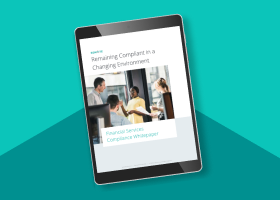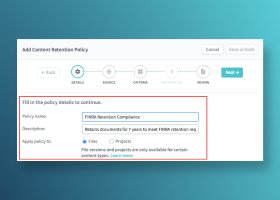FINRA Record Retention Solutions
What Is FINRA For?
The Financial Industry Regulatory Authority (FINRA) is a government-authorized, not-for-profit, self-regulating organization that is supervised by the Securities and Exchange Commission (SEC). It is the largest regulatory body for securities firms in the United States, whose express purpose is to protect investors, maintain the integrity of financial markets, and ensure that capital markets operate fairly.
Established in 2007 through the merger of the National Association of Securities Dealers (NASD) and the New York Stock Exchange’s regulatory division. A self-regulatory organization, FINRA is not a government agency. Rather, it has been authorized by Congress to perform its duties. The bulk of FINRA’s funding comes from the securities firms it regulates.

From offices across the United States and with thousands of employees, FINRA oversees brokerage firms, branch offices, and registered securities representatives (e.g., broker-dealers). FINRA’s state objectives are to assure investors that:
Every investor receives the basic protections they deserve
Anyone who sells a securities product has been tested, qualified, and licensed
Every securities product advertisement used is truthful and not misleading
Any securities product sold to an investor is suitable for that investor’s needs
Investors receive complete disclosure about the investment product before purchase
In addition to oversight of the securities ecosystem and enforcement of rules and regulations, FINRA is responsible for registering and licensing brokerage firms and professionals. To be registered, firms and individuals must pass rigorous qualification examinations and ongoing testing. This ensures that they possess the necessary knowledge and competence to engage with consumers on matters related to securities.
FINRA is also the arbiter and mediator for disputes between investors and brokerage firms. The goal is to provide a cost-effective and efficient alternative to lengthy court proceedings.
What Is the Difference Between FINRA and SEC?
| FINRA | SEC |
| A self-regulating agency, not-for-profit, non-government agency | A government agency |
| Regulates broker-dealers and their agents | Has broad authority over securities markets |
| Established in 2007 as the result of consolidation of other groups | Established in 1934 in the wake of the market crash that led to the Great Depression |
| Funded by its members | Funded by the federal government |
| Protects investors by primarily overseeing all brokers in the securities marketplace | Protects investors in the U.S. by regulating the securities market |
| Focuses on ensuring the conduct and ethical standards of its member firms and associated individuals | Focuses on market integrity, investor protection, and policy development |
What Does It Mean to Have a FINRA License?
Any individual engaging in the investment banking or securities business must have a FINRA license, whether they work with retail or institutional securities customers. To obtain a FINRA license, brokers must pass qualification exams and complete ongoing continuing education programs each year to ensure that they retain the industry standards and practices and stay up to speed on new FINRA rules.
Information about all licensed brokers, dealers, and broker-dealers is collected in FINRA’s Central Registration Depository (CRD). The CRD serves several purposes, including:
- Storing the registration records of broker-dealer firms and their associated individuals, including their qualification, employment, and disclosure histories
- Facilitating the secure processing of supporting records and data, including form filings, fingerprint submissions, qualification exams, and continuing education classes
- Providing information for BrokerCheck, the database for consumers to get information about brokers, advisors, and firms
The most widely held FINRA securities certifications include:
- Series 3
Allows brokers to sell commodity futures contracts. - Series 6
The limited investment securities license allows brokers to sell packaged investment products. - Series 7
Known as the general securities representative license that allows brokers to sell almost any type of individual security (e.g., preferred stocks, options, bonds, and other personal fixed-income investments). - Series 31
A branch of the Series 3 license that is required to sell managed futures (i.e., groups of commodity futures).
- Series 79
Required for brokers to provide advice or facilitate debt and equity offerings (public or private), mergers or acquisitions, tender offers, final restructurings, asset sales, divestitures, or corporate reorganizations. - Series 99
Required to perform functions in the securities industry or broker-dealer operations, such as client onboarding, account transactions, and movement of funds.
Who Is Subject to FINRA?
Broker-dealers, capital acquisition brokers, and funding portals are subject to FINRA record retention rules.
Broker-dealer firms
Broker-dealers buy or sell securities on behalf of their customers or their own accounts or both. A broker-dealer acts as a broker when it processes orders on behalf of its clients, and a dealer when it trades for its own account. Broker-dealers must register with the SEC and are subject to FINRA regulations. These firms include broker-dealers and other traditional Wall Street organizations. They also include large commercial banks, investment banks, and small independent firms.
Capital Acquisition Brokers
A capital acquisition broker is a broker-dealer who is also subject to FINRA retention rules. However, because they engage in a more limited range of activities (e.g., advising on capital raising and corporate restructuring and facilitating sales of unregistered securities to institutional investors under limited conditions), fewer FINRA rules apply to them, because they do not handle customer accounts, funds, or securities and cannot accept customers’ trading orders.
Funding Portals
A funding portal is a crowdfunding intermediary. Title III of the Jumpstart Our Business Startups (JOBS) Act, enacted in 2012, has rules for funding portals, which include registering with the SEC as funding portals and becoming funding portal members of FINRA. All funding portals are subject to FINRA regulatory oversight and reporting requirements, including FINRA record retention rules.
Benefits of FINRA
- Audits firms for compliance with rules
- Confirms that brokers meet annual educational requirements
- Educate investors and consumers, from beginners to advanced levels of experience, with articles, calculators, and other educational materials
- Ensures the integrity of United States capital markets—all at no cost to taxpayers
- Fosters market transparency
- Gives investors protection from potential abuses and unethical conduct
- Maintains BrokerCheck, a database for consumers to get information about brokers, advisors, and firms, including license status, education levels, violations, and sanctions
- Monitors financial markets, including transactions and orders, on a daily basis
- Offers consumers a program and processes to file complaints against brokers or firms
- Provides mediation and arbitration services for dispute resolution between customers and brokers as an alternative litigation
- Writes and enforces rules governing the ethical activities of all registered broker-dealer firms and registered brokers in the United States
Take FINRA Record Retention Seriously
Complying with FINRA record retention rules should be a priority. FINRA has the power to take disciplinary actions against individuals or firms that violate its rules, including those related to record detention. Brokers and brokerage firms that fail to comply with FINRA rules are subject to fines and can be banned from trading.
The Financial Industry Regulatory Authority (FINRA) has the power to penalize brokers and brokerage firms that violate its rules. Disciplinary actions range from warning letters and orders to fix a particular problem to a fine and order for restitution, suspension, or expulsion from the industry.
Egnyte has experts ready to answer your questions. For more than a decade, Egnyte has helped more than 17,000+ customers with millions of users worldwide.
Last Updated: 29th April, 2024


